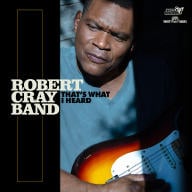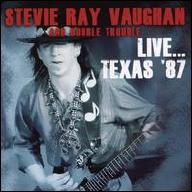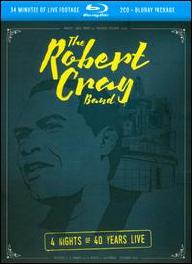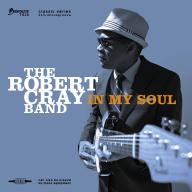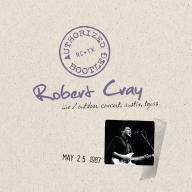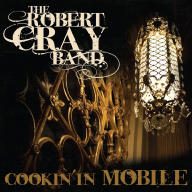Robert Cray was born in Columbus, Georgia on August 1, 1953. His father was a quartermaster with the Army, stationed at Fort Benning, and like many military families, the Crays moved often during Robert's youth. Cray became interested in music after digging deep into his dad's extensive record collection, and after taking lessons in classical piano, he began learning the guitar in his early teens. While attending high school in Newport News, Virginia in the late '60s, Cray formed his first band, the One-Way Street, who landed a gig playing covers at a bar despite being too young to be customers. By the time Cray graduated from high school, his family had settled in the Pacific Northwest, and while living in Tacoma, Washington, Cray developed a passion for the blues, taking particular inspiration from Albert Collins, Freddie King, Muddy Waters, and Buddy Guy. Cray made his way to Eugene, Oregon, where he formed a band with singer Curtis Salgado, and next launched his own group, the Robert Cray Band. Cray and his band toured frequently on the West Coast and were mentored by Cray's hero Albert Collins, who sometimes took them out as his opening act and taught them how to deal with life on the road. In 1978, Cray landed a small part in the hit comedy National Lampoon's Animal House, playing the bassist with Otis Day the Knights.
As word spread about Cray -- under 30, he was considered a fresh, young talent by the standards of the blues -- he cut his debut album, Who's Been Talkin', which was originally released by the independent Tomato label. (It would later be reissued by that label as Too Many Cooks, and then again by Mercury under its original title.) The album earned good reviews, and Cray landed a deal with the blues and roots imprint Hightone Records. His first LP for Hightone, 1983's Bad Influence, included the song "Phone Booth," which would later be covered by Albert King, and False Accusation followed in 1985. That same year, Cray appeared on the album Showdown!, in which he traded licks with two of his favorite guitarists, Albert Collins and Johnny Copeland; the album won a Grammy award for Best Traditional Blues Recording. By this time, Cray's reputation was beginning to spread beyond blues circles, and he left the independents behind to sign a deal with Mercury Records. Cray's Mercury debut, 1986's Strong Persuader, received rave reviews (Robert Christgau in the Village Voice gave it a rare A+ rating), and with radio and MTV support for the first single, "Smoking Gun," it became a major hit and earned Cray his first platinum sales plaque and a Grammy Award for Best Contemporary Blues Recording.
Already having gained plenty of experience in the studio and on the road, Cray didn't waste the opportunities the success of Strong Persuader brought him. Between 1988 and 1997, Cray would cut six more albums for Mercury, two of which -- 1988's Don't Be Afraid of the Dark and 1990's Midnight Stroll -- would go platinum. (Don't Be Afraid of the Dark also brought Cray another Best Contemporary Blues Recording Grammy.) In 1987, Keith Richards invited him to be part of the all-star band that backed Chuck Berry for a filmed concert that was the foundation of the film Hail! Hail! Rock 'n' Roll. Cray maintained a steady touring schedule, headlining dates and becoming a frequent opener for Eric Clapton, as well as warming up audiences for Bob Dylan. (Cray was also a guest at Clapton's Crossroad Guitar Festival events from 2004 to 2019.) Cray shared the stage with Clapton, Buddy Guy, Stevie Ray Vaughan, and Jimmie Vaughan at an August 1990 show in East Troy, Wisconsin that would prove to be the last concert of Stevie Ray's life.
After his contract with Mercury ran its course, Cray struck a deal with the respected indie label Rykodisc, and his first release for the label, 1999's Steve Jordan-produced Take Your Shoes Off, won him a third Best Contemporary Blues Recording Grammy. After a second set for Rykodisc, 2001's Shoulda Been Home, he struck a deal with Sanctuary Records for 2003's Time Will Tell and 2005's Twenty. In 2006, he released the first live album of his career, Live from Across the Pond, culled from a series of shows at London's Royal Albert Hall. It was a joint release between Vanguard Records and Cray's own Nozzle Records label; Vanguard and Nozzle would also team up for 2009's This Time. A concert at the Saenger Theater in Mobile, Alabama would result in Cray's second live album, 2010's Cookin' in Mobile, and he was unwittingly competing with himself in the marketplace when Mercury released an archival concert set the same year, Authorized Bootleg: Austin, Texas, 5/25/87. Cray was inducted into the Blues Hall of Fame in 2011, and the following year, he issued his first album for the European Provogue label, Nothin' but Love, inspired by stories of romance and resilience in an economic downturn. After a second LP for Provogue, 2014's In My Soul, Cray recorded a passion project, 2017's Robert Cray Hi Rhythm, where he was backed by the Hi Records house band (best known for their work on Al Green's hits of the '70s) during sessions at the studio where they did most of their work, Memphis' Royal Recorders. The album reunited Cray with producer Steve Jordan, and they went into the studio again for 2020's That's What I Heard. The project was issued by Nozzle Records as part of a new distribution deal with Thirty Tigers. ~ Mark Deming, Rovi


